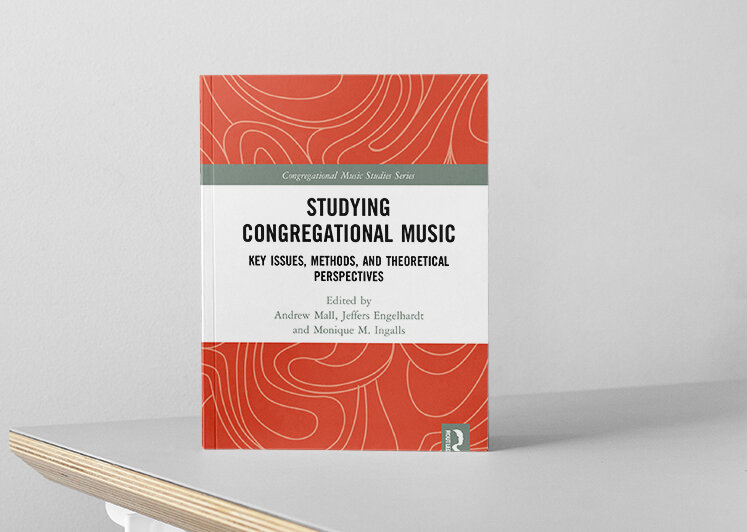

God RocK, Inc.:
The Business of Niche Music
Popular music in the twenty-first century is increasingly divided into niche markets. How do fans, musicians, and music industry executives define their markets’ boundaries? What happens when musicians cross those boundaries? What can Christian music teach us about commercial popular music? In God Rock, Inc., Andrew Mall considers the aesthetic, commercial, ethical, and social boundaries of Christian popular music, from the late 1960s, when it emerged, through the 2010s.
University of California Press (2021)
Table of Contents:
Introduction: Popular Music, Markets, Margins, and the Curious Case of Christian Music [Spotify playlist]
Part One: Christian Music: An Industry and Its History
Chapter 1: “Why Should the Devil Have All the Good Music?” The Christian Markets Origins [Spotify playlist]
Chapter 2: The Great Adventure: Commercial Success in the Christian Record Industry and the Price of Profit [Spotify playlist]
Chapter 3: A Wolf in Sheep’s Clothing? Christian Ethics Encounter Rock [Spotify playlist]
Chapter 4: “Find a Way”: Amy Grant and the Christian Market’s Mainstream [Spotify playlist]
Part Two: Niche Music Markets: Ethics, Profits, and Risk
Chapter 5: Music to Raise the Dead: Christian Music and the Ethics of Style [Spotify playlist]
Chapter 6: Lost in the Sound of Separation: Resistance at Christian Music Festivals [Spotify playlist]
Chapter 7: From Margins to Mainstreams and Back: Crossover Cases and Their Markets [Spotify playlist]
Conclusion: The Stability of Risk and the Risk of Stability [Spotify playlist]
God Rock, Inc. Extras
Leah Payne reviewed God Rock, Inc. for the Journal of Religion, Media and Digital Culture.
Rock That Doesn’t Roll podcast (2023). Who could a 1990s Christian rock aficionado turn to in order to find the latest and greatest releases? For mainstream music fans, tastemakers included record store clerks of 1990s indie music stores, or retail juggernauts like Tower Records and Wherehouse - the kind of superfans depicted by Jack Black in High Fidelity. But for many evangelical teens of the 1990s, record stores were not the place to find kid-tested, parent-approved music. For that, Christian teens usually had to go to Christian bookstores.
AAR (2023) “author meets critics” panel on God Rock, Inc. Panelists will consider how Christian music as a niche business shapes religious communities in the United States (and beyond), as well as how its many genres and subgenres - pop, rock, metal, rap, hip hop, praise and worship, etc. - reflect and shape evangelical Christian politics, practice, and theology.
Christianity Today (2023). Author Kelsey Kramer McGinnis quotes from God Rock, Inc. in her article on the the corporate consolidation of worship music.
Jason Lee Guthrie reviewed God Rock, Inc. for the Journal of the Music and Entertainment Industry Educators Association (MEIEA).
Christianity Today (2022). Author Kelsey Kramer McGinnis quotes from God Rock, Inc. in her article on the Gospel Music Association’s Dove Awards (the Christian music industry’s answer to the Grammy Awards).
Christianity Today (2022). Author Rachel Seo quotes from God Rock, Inc. in her article on TikTok and Christian recording artist Montell Fish.

Studying Congregational Music:
Key issues, methods, and theoretical perspectives
Studying the role of music within religious congregations has become an increasingly complex exercise. The significant variations in musical style and content between different congregations require an interdisciplinary methodology that enables an accurate analysis, while also allowing for nuance in interpretation. This book is the first to help scholars think through the complexities of interdisciplinary research on congregational music-making by critically examining the theories and methods used by leading scholars in the field.
Co-edited with Monique M. Ingalls and Jeffers Engelhardt.
Routledge (2021)
FOR A LIMITED TIME: save 20% when you purchase the book directly from the publisher using the discount code “FLY21”
Table of Contents:
Part I: Methodological Perspectives
Chapter 2: Worshipping “With Everything”: Musical Analysis and Congregational Worship (Joshua Kalin Busman) [Spotify playlist]
Chapter 4: Ethnography in the Study of Congregational Music (Jeff Todd Titon)
Chapter 5: Re-sounding the History of Christian Congregational Music (Sarah Eyerly)
Part II: Key Issues
Chapter 7: Political Economy and Capital in Congregational Music Studies: Commodities, Worshipers, and Worship (Andrew Mall) [Spotify playlist]
Studying Congregational Music Chapter Previews
Studying Congregational Music, Routledge (2021). Chapter 14, “Ecclesioscapes: interpreting Gatherings around Christian Music in and outside the Church through the Dutch Case of the ‘Sing Along Matthäuspassion,’ ” by Mirella Klomp.
Studying Congregational Music, Routledge (2021). Chapter 13, “Searching for a Metaphor: What Is the role of the Shaliach/Shalichat Tzibur (Leader of Prayer)?” by Jeffrey A. Summit.
Studying Congregational Music, Routledge (2021). Chapter 11, “Congregational Singing and Practices of Gender in Christian Worship: Exploring Intersections,” by Teresa Berger.
Studying Congregational Music, Routledge (2021). Chapter 11, “Studying Byzantine Ukrainian Congregational Music in Canada: Considering Community and Diaspora,” by Marcia Ostashewski.
Studying Congregational Music, Routledge (2021). Chapter 10, “Researching Black Congregational Music from a Migratory Point of View: Methods, Challenges, and Strategies,” by Melvin L. Butler.
Studying Congregational Music, Routledge (2021). Chapter 9, “ ‘We Just Don’t Have It’: Addressing Whiteness in Congregational Voicing,” by Marissa Glynias Moore.
Studying Congregational Music, Routledge (2021). Chapter 8, “Congregation and Chorality: Fluidity and Distinction in the Voicing of Religious Community,” by Jeffers Engelhardt.
Studying Congregational Music, Routledge (2021). Chapter 7, “Political Economy and Capital in Congregational Music Studies: Commodities, Worshipers, and Worship,” by Andrew Mall.
Studying Congregational Music, Routledge (2021). Chapter 6, “Music Theology as the Mouthpiece of Science: Proving It through Congregational Music Studies,” by Bennett Zon.
Studying Congregational Music, Routledge (2021). Chapter 5, “Re-sounding the History of Christian Congregational Music,” by Sarah Eyerly.
Studying Congregational Music, Routledge (2021). Chapter 4, “Ethnography in the Study of Congregational Music,” by Jeff Todd Titon.
Studying Congregational Music, Routledge (2021). Chapter 3, “Mediating Religious Experience? Congregational Music and the Digital Music Interface,” by Anna E. Nekola.
Studying Congregational Music, Routledge (2021). Chapter 2, “Worshipping ‘With Everything’: Musical Analysis and Congregational Worship,” by Joshua Kalin Busman.
Studying Congregational Music, Routledge (2021). Chapter 1, “In Case You Don’t Have a Case: Reflections on Methods for Studying Congregational Song in Liturgical History,” by Lester Ruth.
Studying Congregational Music, Routledge (2021). Introduction, “Interdisciplinarity and Epistemic Diversity in Congregational Music Studies,” by Andrew Mall, Jeffers Engelhardt, and Monique M. Ingalls.
Looking for more information?
Forum Daily News (2025). Forum Daily News is a weekly news program produced by The News Forum (TNF). TNF is a Canadian broadcaster with a mandate to provide viewers with politically balanced domestic and international perspectives, intended to be a counterbalance to the prevailing media landscape. In this interview, I discuss dynamic-pricing mechanisms, how demand-based pricing works in the concert/ticketing sector, how artists/management negotiate with platforms like Ticketmaster, and what the consumer-impact tends to be.
NGN (2025). Allegations of sexual misconduct have hit the Christian music community. At least five men accused internationally known Christian musician Michael Tait of sexual assault, in what Andrew Mall, associate music professor at Northeastern University, called “the highest-profile case” he’s seen in this section of the music industry.
Music plays important roles in religious contexts: among other things, it connects worshippers to spiritual realms, centers practitioners within continuous traditions, distinguishes between sacred and secular spaces (and places), enables communal cohesion, facilitates transcendent experiences, imbues everyday activities with religious intent, orients believers to ritual practices, and contributes to religious identities, both at the individual and the collective (or congregational) levels.
In this capstone course for music industry students, we explore contemporary analyses and issues with an eye toward critically assessing and engaging the music industries. Each student brings to the classroom a unique set of skills and experiences, including those grounded in coursework and experiential learning (such as co-ops, internships, research, service learning, study abroad, and other activities). During seminar, we learn together as a class from these individualized experiences and sets of expertise—the sum of our knowledge, in essence, is greater than its individual parts.
NGN (2025). After Taylor Swift announced her latest album, “The Life of a Showgirl,” fans began pre-ordering limited-release vinyls, CDs and even cassette tapes. While it may have been a while since the average person has bought a cassette tape, Andrew Mall, associate music professor at Northeastern University, says cassettes have percolated on the music scene and have become popular again over the last 10 to 15 years.
NGN (2025). Experts explain what makes the subject of “It’s Never Over, Jeff Buckley” one of the most legendary artists of his generation, despite only releasing one studio album before his premature death. Despite only releasing one studio album, “Grace,” prior to tragically drowning at the age of 30 in 1997, Buckley remains one of the most legendary — and subtly influential — artists of his generation.
NGN (2025). “Buckingham Nicks” was released in 1973 to minimal fanfare; the couple’s label, Polydor Records, dropped it within months of their release. The following year, the couple joined Fleetwood Mac, making them the notable figures they are today. But while you can easily find copies of or stream all of the duo’s other work — both in Fleetwood Mac and as solo artists — “Buckingham Nicks” was never reissued. Why reissue “Buckingham Nicks” now, after decades that were filled with breakups, makeups, reunion tours, and lawsuits for the pair? Andrew Mall, an associate professor of music at Northeastern University, thinks it could be a sign that things are thawing between the two exes.
NGN (2025). Andrew Mall, associate professor of music, has a collection of 1,500 records. He gives his top tips for those venturing into the world of buying vinyl records.
The Rumors Are True (podcast, 2025). Host Jeremy Alan Gould interviews Dana Bollen and Andrew Mall about making their new podcast, Live Free or DIY.
Fortune (2025). Billy McFarland’s Fyre Festival chapter has come to a close. The disgraced owner of the brand behind the disaster luxury music festival sold its intellectual property for $245,300 on eBay. The sum falls far short of some of the ticket options McFarland previously promised for a planned Fyre Festival event, including a $1.1 million package. The final bid falls further still than the $26 million in restitution following McFarland’s wire-fraud conviction.